 MyDogBreeds
MyDogBreeds Chesapeake Bay Retriever is originated from United States but Bearded Collie is originated from United Kingdom. Chesapeake Bay Retriever may grow 11 cm / 5 inches higher than Bearded Collie. Chesapeake Bay Retriever may weigh 18 kg / 40 pounds more than Bearded Collie. Both Chesapeake Bay Retriever and Bearded Collie has almost same life span. Both Chesapeake Bay Retriever and Bearded Collie has same litter size. Chesapeake Bay Retriever requires Low maintenance. But Bearded Collie requires High maintenance
Chesapeake Bay Retriever is originated from United States but Bearded Collie is originated from United Kingdom. Chesapeake Bay Retriever may grow 11 cm / 5 inches higher than Bearded Collie. Chesapeake Bay Retriever may weigh 18 kg / 40 pounds more than Bearded Collie. Both Chesapeake Bay Retriever and Bearded Collie has almost same life span. Both Chesapeake Bay Retriever and Bearded Collie has same litter size. Chesapeake Bay Retriever requires Low maintenance. But Bearded Collie requires High maintenance
 Fondly referred to as the Chessie, the ‘Labrador-look-alike’ Chesapeake Bay Retriever’s history extends to St. Johns Newfoundland pups which were rescued off a ship off the coast of Maryland in 1807. The Chesapeake is an American breed.
Fondly referred to as the Chessie, the ‘Labrador-look-alike’ Chesapeake Bay Retriever’s history extends to St. Johns Newfoundland pups which were rescued off a ship off the coast of Maryland in 1807. The Chesapeake is an American breed.
It is believed that the Newfoundland puppies as they grew, were bred with area dogs, with there being few records of the early dogs, but it is believed that spaniels and dogs were included.
In 1918 the Chesapeake Bay Retriever was recognized by the American Kennel Club and in 1964 the dog was declared the official dog of Maryland.
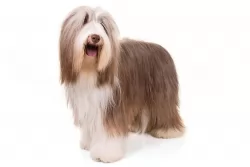 This long-haired herding breed was bred by mixing the two sheepdog breeds: the Scottish dogs and the Polish sheepdogs. The Bearded Collie gained the popularity during the last century by winning some of the Dog Shows. This friendly dog with the beautiful coat is surely one of the most specific pets. Nowadays, the Bearded Collie is very popular. The organizations for breeding, saving, rescuing and adopting this breed can be found in the USA.
This long-haired herding breed was bred by mixing the two sheepdog breeds: the Scottish dogs and the Polish sheepdogs. The Bearded Collie gained the popularity during the last century by winning some of the Dog Shows. This friendly dog with the beautiful coat is surely one of the most specific pets. Nowadays, the Bearded Collie is very popular. The organizations for breeding, saving, rescuing and adopting this breed can be found in the USA.
 The Chesapeake is a large dog belonging to the Sporting breed group. Perhaps one of the more distinctive features of the Chesapeake Bay Retriever is the yellowish eyes.
The Chesapeake is a large dog belonging to the Sporting breed group. Perhaps one of the more distinctive features of the Chesapeake Bay Retriever is the yellowish eyes.
This is a strong, well muscled dog that stands anywhere from 61 – 66cm and weighs between 30 – 45kg. The short, thick coat of the dog is waterproof and comes in colors ranging from brown to reddish yellow to chestnut shades.
The head of the Chesapeake is broad and roundish with medium length floppy ears. The tail is long. The toes are webbed which helps makes the dog an excellent swimmer as well.
The Chesapeake Bay Retriever is a happy kind of dog with a bright, alert, intelligent expression. He loves water and is guaranteed to make a wonderful pet for any family.
With his wonderful characteristics, it is worth training him and socializing him as this training sets parameters for him so that he becomes a wonderfully obedient dog that gets on well with other pets in the home as well as with children.
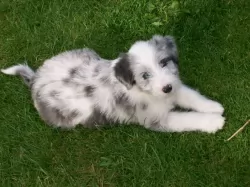 The Beardie is easy to recognize because of the longer hairs on the cheeks, chin and under the lower lip. This medium-sized Bouncing Beardie is usually the great family pet because he is very friendly and loving. This breed is extremely active and they are energetic despite their longer bodies. They grow up to have more than one coat colour, but they are all born one coloured. They always have white or cream markings. This smart dog can be very stubborn and independent, if you keep your dog in a yard, he will use every chance to escape.
The Beardie is easy to recognize because of the longer hairs on the cheeks, chin and under the lower lip. This medium-sized Bouncing Beardie is usually the great family pet because he is very friendly and loving. This breed is extremely active and they are energetic despite their longer bodies. They grow up to have more than one coat colour, but they are all born one coloured. They always have white or cream markings. This smart dog can be very stubborn and independent, if you keep your dog in a yard, he will use every chance to escape.
 The Chesapeake Bay Retriever is ready to be your best friend and companion. This dog breed is highly active and he’ll fit easily into a family that is active and can ensure he is involved in all their activities.
The Chesapeake Bay Retriever is ready to be your best friend and companion. This dog breed is highly active and he’ll fit easily into a family that is active and can ensure he is involved in all their activities.
The beauty about the Chesapeake Bay Retriever is that he is generally an even tempered dog, and once trained and socialized, becomes a truly splendid pet, one that will be loving and loyal with his owners.
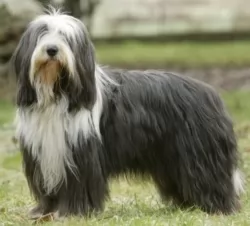 The Bouncing Beardie is great with children. They are very playful, jumpy and have generally very sweet and gentle personality. Children love them because they never get tired. If properly socialized, this dog can be the main attraction for any child.
The Bouncing Beardie is great with children. They are very playful, jumpy and have generally very sweet and gentle personality. Children love them because they never get tired. If properly socialized, this dog can be the main attraction for any child.
Herding, agility shows, obedience competitions, treibball, show dogs, trally...
This breed is very friendly. If your family is about to raise the Bearded Collie, prepare to have a pet that is highly affectionate and bonded with the members of the family. They don’t do well if left alone. They usually don’t bark and they are never destructible, but loneliness somehow triggers odd behaviour with this breed. They are not usually scared of strangers. If they are trained and socialized, you will be able to take your Beardie anywhere you go.
Some say that is very easy to train the Bearded Collie. The rule for this breed is to start the obedience training while they are very small. They are generally very independent, and they will try to do things in their own way. If you start your training early before your Beardie forms this kind of personality, you will have a wonderful pet.
 By taking good care of your Chesapeake, you can ensure his teeth remain strong, his nose is wet and his coat glossy and healthy. He is a robust breed as it is, but there are always some common dog diseases to watch out for -
By taking good care of your Chesapeake, you can ensure his teeth remain strong, his nose is wet and his coat glossy and healthy. He is a robust breed as it is, but there are always some common dog diseases to watch out for -
Obesity is an ailment that is afflicting many humans and their pets. Being overweight can bring on a host of unwanted diseases. Obesity is a serious disease that can contribute to digestive disorders, back pain, heart disease and joint problems.
Instead of showering him with little treats to show him how much you love him, rather stroke him or play a game with him – it’s the ultimate treat for him – your attention.
Remember that if you aren’t going to let your Chessie become a parent, the best thing you can do for your male or female is to have them spayed or neutered. In fact, spaying or neutering can decrease the likelihood of your pet getting certain types of cancers as well as other illnesses. Speak to your vet and discover how these procedures can be very beneficial for your pet.
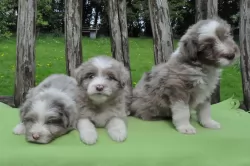 This breed is generally very healthy. They don’t have some major health issues. Some of the issues that are registered are:
This breed is generally very healthy. They don’t have some major health issues. Some of the issues that are registered are:
The degenerative disease that causes the blindness.
When the hormone produced by the thyroid gland is abnormally low.
That is generally the hereditary disease, can also be caused by bad diet or injuries.
To food, chemicals, pollen, dust...
That usually happens because of their dropped ears that are not very easy to clean.
 The Chesapeake Bay Retriever sheds fairly heavily throughout the year. The coat should be brushed at least twice a week to remove dead hair. Brushing is good for the dog too as it distributes the oils of the skin, making his coat shinier.
The Chesapeake Bay Retriever sheds fairly heavily throughout the year. The coat should be brushed at least twice a week to remove dead hair. Brushing is good for the dog too as it distributes the oils of the skin, making his coat shinier.
Because the Chesapeake has floppy ears, the ears will need to be checked on a weekly basis for signs of infection. This is of particular importance if your Chessie loves to spend time splashing around in water. The veterinarian can recommend and also advise on cleaners for your dog’s ears.
An excellent diet and plenty of exercise will ensure your Chessie can live to be 11, 12 or 13 years of age. You want to keep his diet of kibble, rice, vegetables and meat consistent so as not to upset his stomach.
Avoid giving him foods such as chocolates. Do research on the harm you can do to your pet when you feed him some human foods that are entirely not meant for a dog’s digestive system.
The Chesapeake Bay Retriever has always loved to be active - hunting for- and retrieving birds from rivers and lakes. He is used to being active and will require a good supply of exercise. Take him for long walks and let him join you on your runs or your cycling.
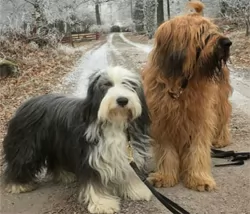 Raising your Bearded Collie pup on a high-quality food is usually enough for a puppy. Make sure that portions are appropriate for his age and weight. Once your pet is more than six months old, they will need only two meals per day. They get obese very easy. Don’t train them with the treats.
Raising your Bearded Collie pup on a high-quality food is usually enough for a puppy. Make sure that portions are appropriate for his age and weight. Once your pet is more than six months old, they will need only two meals per day. They get obese very easy. Don’t train them with the treats.
To care for your Bearded Collie, you must be aware of the grooming responsibilities that come with this longhaired pet. During the shedding period, it is required to brush them daily. Bathing is not a regular necessity but it will be easier to keep him clean and well groomed if you care about your pet all the time. Some people like to shorten the coat for their Beardie, and it is usually done during summer. Make sure to take him to regular ear, eye, teeth and hip vet checks.
The Bearded Collie is a breed that requires daily activity. They have very playful nature and they love to run, play and spend time outdoors. The best option will be a big yard so that Beardie can run for hours without the leash.